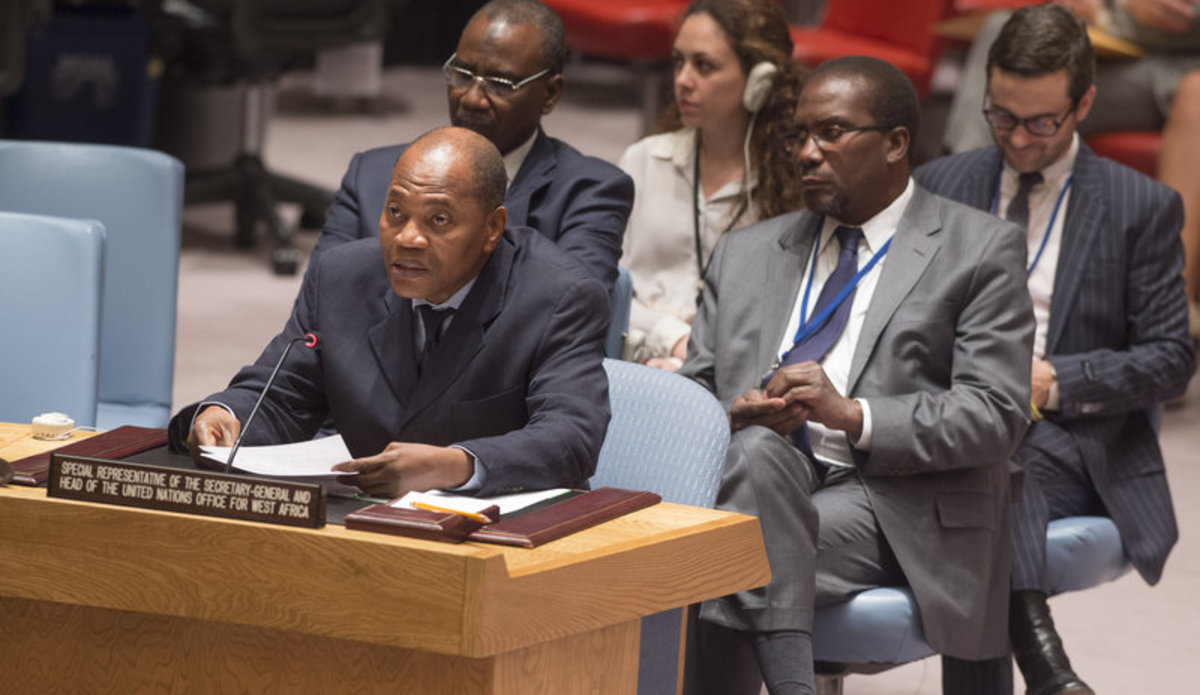Mr. President,
Distinguished Council Members,
I am pleased to be here today to brief you on the situation in West Africa and the implementation of UNOWA’s mandate. Further to the 16th report of the Secretary-General on the activities of the United Nations Office for West Africa (UNOWA), which is before you, I would like to highlight a few issues and update you on the most recent developments.
In the last six months, there were a number of key political developments in West Africa. Peaceful and credible elections were held in several countries. In Burkina Faso, the transitional institutions ensured the holding of the presidential and legislative elections in a timely manner, despite the challenges that emerged following the failed coup d’état of 16 September. I would like to seize this opportunity to reiterate my congratulations to the people and leaders of Burkina Faso for their exemplary conduct and peaceful and responsible participation during the polls. The inauguration of President Roch Marc Christian Kaboré marked a successful end to the transition period. In Guinea, a dialogue process, supported by the United Nations in coordination with regional and international actors, enabled the holding of presidential elections in accordance with constitutional deadlines. The peaceful holding of the polls, which resulted in the re-election of President Alpha Conde, constitutes an important milestone in the country’s process of democratic consolidation. Peaceful polls were also conducted in Côte d’Ivoire, resulting in the re-election of the incumbent President Alassane Ouattara. With regard to Nigeria, I am encouraged by the establishment of a new Government and its commitment to actively combating corruption. This will contribute to the creation of an environment that will allow the country to realize its full economic potential. These developments demonstrate the democratic resolve of the people of West Africa.
As Council members are aware, five presidential elections are scheduled to take place in 2016 in Benin, Cabo Verde, The Gambia, Ghana and Niger. In the lead-up to these elections, I will continue to call on national stakeholders to utilize dialogue to resolve outstanding electoral-related issues so as to create a conducive environment for the holding of peaceful, credible and inclusive elections.
Mr. President,
Violent extremism and terrorist activities remain a major threat to security and development in West Africa, further aggravating the region’s humanitarian challenges. While some progress has been made in the fight against Boko Haram, the terrorist group continues its indiscriminate attacks against civilians not only in Nigeria, but also in Niger, Chad, and Cameroon. Boko Haram continues to adapt its tactics, and is increasingly resorting to using young boys and girls for suicide attacks. In response, countries in the region have intensified their efforts to combat these terrorist threats, and have improved cooperation in areas such as intelligence-sharing. As they conduct military operations against the group, it is critical that they maintain adherence to international Human Rights, Humanitarian and Refugee Laws. It is also crucial for countries of West and Central Africa to also work on developing strategies that address the root causes of the insurgency, and notably the underlying socio-economic grievances of marginalized communities. In this regard, SRSG Bathily and I are working to ensure that the expected joint ECOWAS and ECCAS Summit take place as soon as possible.
Mr. President,
There has also been some progress in the area of Security Sector Reform. The new UN Senior Security Sector Reform Adviser, recently appointed by the Secretary General to support President Alpha Conde of Guinea in his efforts to advance the implementation of SSR, is already working intensely with the President and the government. At the President’s request, the Technical Follow-Up Commission and all five technical sectoral committees on SSR, led by the Senior SSR Adviser, have resumed the holding of meetings.
Concerning drug trafficking and transnational organized crime, in November, I chaired a meeting of the High Level Policy Committee of the West Africa Coast Initiative (WACI). I was pleased to note the commitment of countries in the region to fight this scourge. The Transnational Organized Crime Units in Sierra Leone, Guinea Bissau and Liberia have been conducting effective joint investigations, while the unit in Côte d’Ivoire is working to become operational shortly.
Regrettably, progress has been slower in the area of maritime security in the Gulf of Guinea. The Inter-regional Coordination Centre in Yaoundé, inaugurated in September 2014, is still not fully operational, and the Coordination Centre covering Togo, Benin, Niger and Nigeria, has yet to receive staff, funding and equipment. We continue to urge all partners to intensify their cooperation on this matter.
Mr. President,
We welcome, with satisfaction, the news that there are no more active Ebola cases in the region. In this regard, I would like to pay tribute to the national and international actors that contributed to this achievement. At present the task of rehabilitating essential services calls for our undivided attention. The epidemic has dramatically unveiled the fragility of national health systems, and highlighted the importance of effective governance. Its repercussions will continue to be felt in the form of secondary fatalities due to inadequate capacities and loss of livelihoods, which have compounded an economic crisis in countries already severely affected by the decline in commodity prices.
I salute the resilience of the people of West Africa in overcoming adversity and their commitment to uphold democratic principles, and I want to assure you that the UNOWA will not relent in accompanying their efforts toward enhanced democracy and sustainable development. In light of the support this Council has consistently provided to our engagements, I am confident that the United Nations will continue to remain a most relevant partner to the countries and institutions of the West African region.
Mister President,
Distinguished Members of the Security Council,
I thank you for your attention.

